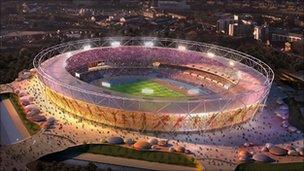Indian Olympic body 'rules out' London 2012 boycott
- Published

The wrap sponsored by Dow will cover the outside of the stadium
The Indian Olympic Association has said there is "no question" of a boycott of the 2012 London Games amid a row over one of the sponsors.
The chief minister of Madhya Pradesh had called for Indian athletes to stay away unless the organisers ended sponsorship from the Dow Chemical company.
Dow has links to the firm behind the deadly Bhopal gas disaster in 1984.
The company says the issue of compensation for victims is settled.
The Indian Olympic Association (IOA) is due to meet next week, but acting president Vijay Kumar Malhotra told Reuters news agency a boycott would not be on the agenda.
The Hindu newspaper quoted Mr Malhotra as saying: "There is no question of India boycotting the London Olympics. We are not boycotting the Olympic Games and that is very clear on the IOA's part."
However, the paper also reported Mr Malhotra as saying the sponsorship issue would be raised with the London organisers.
"We want to express in black and white that there has been opposition in the country to the London Games being associated with Dow Chemical," he said.
Dow is to create a fabric wrap for the Olympic stadium.
'Not appropriate'
Opposition to the sponsorship deal has been led by Madhya Pradesh Chief Minister Shivraj Singh Chauhan, in whose state Bhopal lies.
He wrote a letter to Sports Minister Ajay Maken saying it was not appropriate for a company linked to such a tragedy to be allowed to sponsor an event "considered as an ultimate expression of fair play, honesty and healthy endeavour".
At least five victims' groups have also demanded the sponsorship deal be scrapped.
In 1999, Dow merged with the Union Carbide Corporation, whose subsidiary Union Carbide India ran the Bhopal pesticide plant where the disaster happened.
The gas leak was one of the world's worst industrial disasters.
The Indian government says more than 3,000 people died within days of the leak.
It says that more than 15,000 have died since then.
Campaigners say the death toll is as high as 25,000 and that the effects of the leak continue to this day.
'Vision for the future'
Dow has said in the past that its $470m (£288m) settlement for those affected by the tragedy is fair and final.
The company insists that while the past must never be forgotten, its "position as a Worldwide Olympic Partner" represents its "vision for the future".
Dow has said that although it "never owned nor operated the [Bhopal] plant and the legal claims surrounding the incident were resolved in 1989, long before Dow acquired Union Carbide, we - along with the rest of industry - have learned from this tragic event and have helped to drive global industry performance improvements to ensure that such incidents never happen again".
London 2012 chairman Lord Coe has defended Dow's role, saying he was satisfied, "that at no time did Dow operate, own or were involved with the plant either at the time of the [1984] disaster or crucially at the time of the full and final settlement".
It had earlier been reported that Dow, the world's second largest chemical manufacturer, would be allowed to advertise on the 336 panels of the new stadium wrap.
However, a spokesman for the London Organising Committee of the Olympics told the BBC that, although Dow would fund and make the fabric wrap, it would not be allowed to advertise on the panels.
Under strict IOC "clean venue" rules no company is allowed to advertise during the period of the Games.
Dow is one of 11 Worldwide Olympic Partners, in a list that also includes Coca-Cola, McDonald's, Samsung, Panasonic and Visa.
- Published15 November 2011
- Published8 August 2011
- Published4 August 2011
- Published8 February 2011